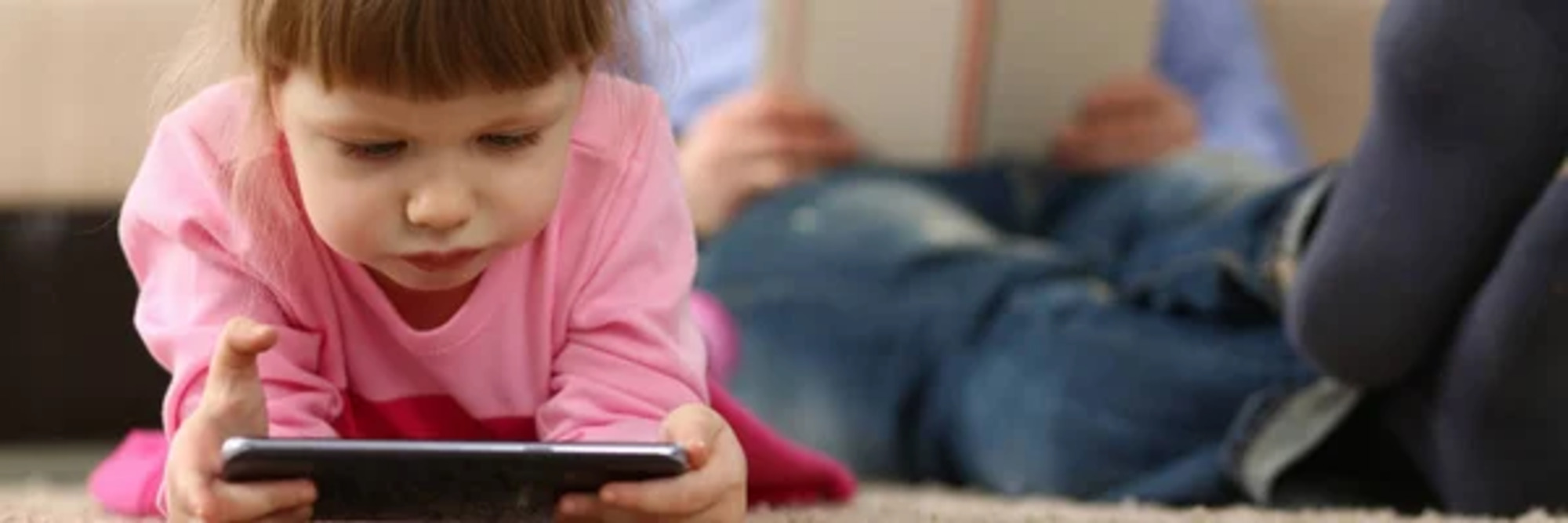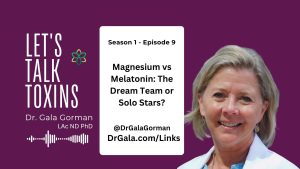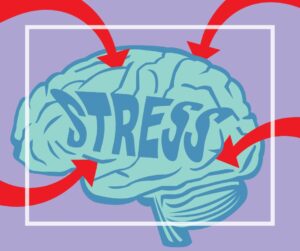The quantity and quality of our sleep is a major factor that determines our overall health and well-being. The time we spend sleeping has the most potential for positively impacting our health. It’s when our body does all of the necessary repair work and is rejuvenated.
Dr. Gala’s Quick Take
Yes, blue light affects sleep by disrupting your body’s natural sleep-wake cycle, making it harder to fall asleep. To reduce its impact, avoid screens at least an hour before bed and use blue light filters on your devices or blue blocker glasses.
Are you aware of the effects of blue light on sleep?
So, how do blue screens affect our sleep?
Blue light can significantly disrupt our sleep, particularly by interfering with the production of melatonin. That’s the hormone that regulates our sleep-wake cycle. Melatonin is naturally produced by the pineal gland in the brain and is released into the bloodstream as it gets darker outside … signaling to our bodies that it’s time to sleep.
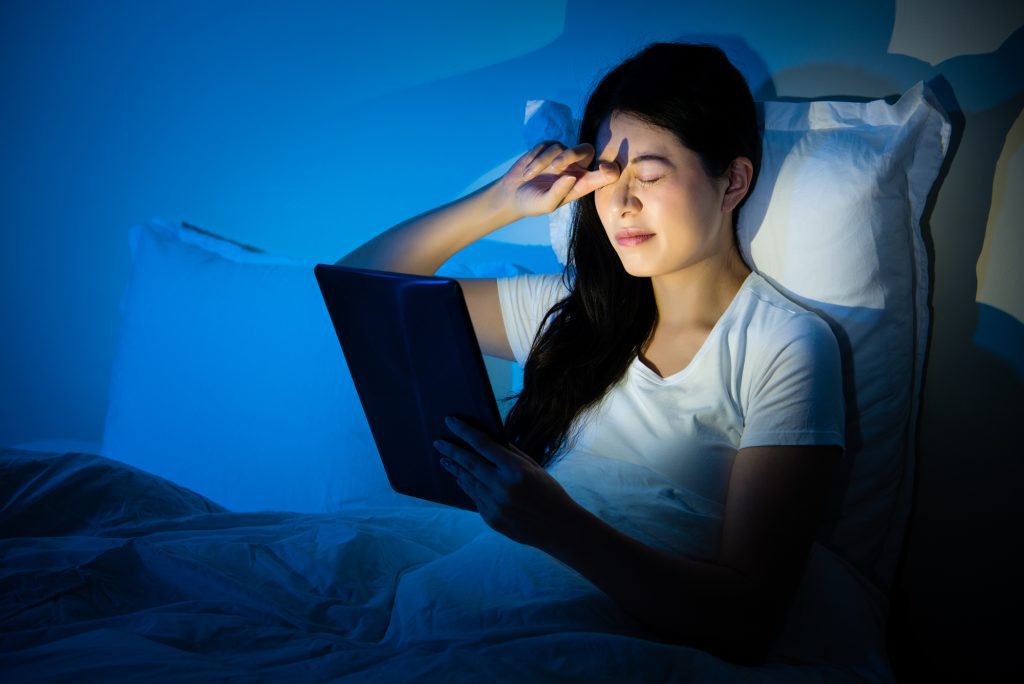
Exposure to blue light … especially in the evening … can significantly reduce melatonin production, making it harder to fall asleep and stay asleep. This reduces the amount of repair work that your body can take care of at night.
The blue light from the screens of electronic devices like smartphones, tablets, and computers can disrupt melatonin production for up to two hours. If you’re on a screen right before trying to go to sleep … you’ll have trouble falling asleep and then settling into deep, restful sleep.
This leaves us feeling groggy, irritable, and tired the following day … which can negatively impact our productivity and overall quality of life.
The blue light from electronic devices can also impact our circadian rhythms. This is our internal clock that regulates every body system. When we are exposed to blue light at night, our bodies may become confused, thinking it is daytime. This can disrupt our internal timing and throws off many signals that our body relies on to function optimally.
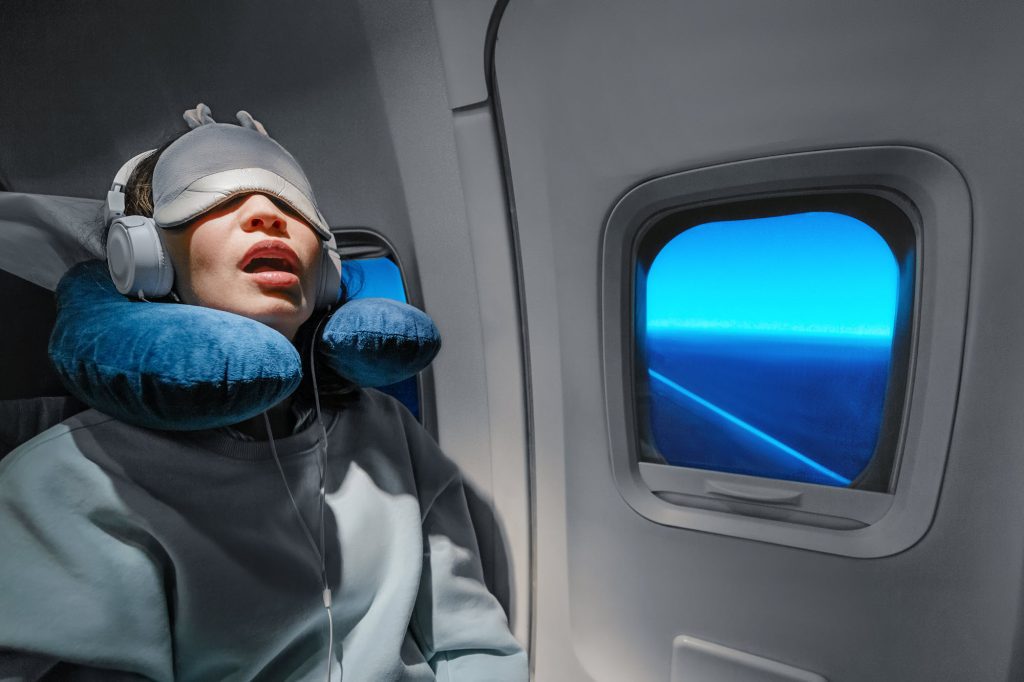
Have you experienced jet lag? Even just shifting your “clock” a few hours can really cause a disruption. If you have significantly disrupted your circadian rhythms, it can take several days to recover even when we stop the interference.
To minimize the effects of blue screens on sleep, it’s recommended that we avoid exposure to blue light at least an hour before bedtime. I would extend that even further to several hours.
And, bedtime should be no later than 11PM. That’s when our bodies are “hard wired” to go to sleep.
Sources of exposure to blue light are everywhere we look.
You’ll need to turn off electronic devices and minimize exposure to artificial light sources. If this seems impossible, you’ll need some high-quality blue blocker glasses … that are comfortable so that you will really use them!
Getting outside in the evening light is a game-changer. My husband’s family calls it a post-prandial perambulation … also known as an after-dinner walk. Highly recommended.
It’s also helpful to create a sleep-conducive environment. A few ideas …
- Blackout curtains
- Cooling for the bedroom so that you can keep it below 70 degrees (68 is better)
- Quiet … and if that’s not possible use a white noise machine to block out unwanted noise
Sleep isn’t the only thing that blue light has a negative impact on. It can affect our health in other ways too.
Blue screens can cause eye strain and headaches.
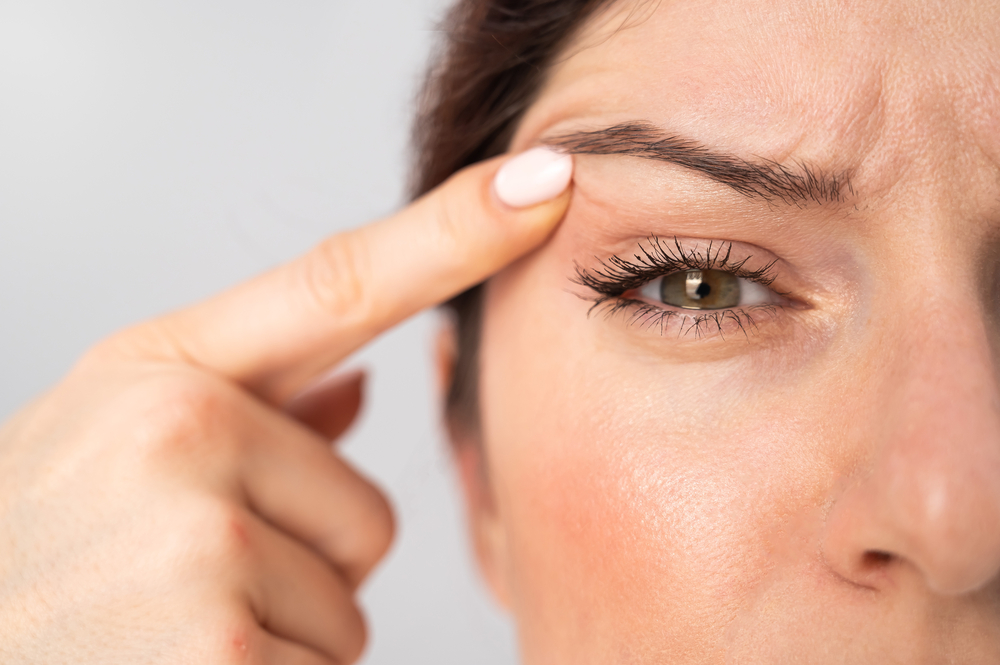
If you regularly stare at a screen for long periods of time, you know the discomfort and fatigue this can cause. The blue light emitted by screens scatters more easily than other colors, making it harder for our eyes to focus. Over time, this results in eye strain and headaches … and can even cause migraines.
Exposure to blue screens can have long-term negative effects on our vision … potentially damaging the retina. Blue light is a high-energy wavelength that our eyes weren’t designed to handle for long periods of time.
What’s known as “digital eye strain” has been linked to blue screens. It’s a condition commonly associated with symptoms like:
- Dry eyes
- Headaches
- Blurred vision (including floaters)
- Neck and shoulder pain
When our eyes work harder to focus and maintain visual acuity it leads to eye fatigue and discomfort … just like any other body part that’s overused.
Studies have suggested that excessive exposure to blue light over time may increase the risk of developing macular degeneration … a progressive eye disease that can lead to vision loss. Blue light can penetrate more deeply into the retina than other colors, potentially causing damage to the light-sensitive cells in the back of the eye.
To protect our vision from the harmful effects of blue screens, there are several strategies we can adopt.
- Minimize screen time and take regular breaks when using electronic devices, giving our eyes a chance to rest and recover.
- Adjust the brightness and contrast of our screens to reduce glare and eye strain.
- Use screen filters or wear blue-light-blocking glasses to reduce our exposure to harmful blue light.
When you aren’t sleeping well or are regularly trying to manage headaches, it’s understandable that you’d feel a little “down.”
Blue Light Affects Our Mood

Exposure to blue screens can have a negative impact on our mood, potentially leading to irritability, mood swings … even depression.
How do you feel when you don’t get enough sleep? Irritable, short-tempered, low energy … or just “blah.” Quality sleep is critical if we want to be happy and productive.
Melatonin is thought of as the sleep hormone but it also helps us feel calm and relaxed. If our body’s natural process for producing melatonin is disrupted it’s impossible to get high-quality sound sleep. This can lead to feelings of restlessness and anxiety … again making it difficult to fall asleep and stay asleep.
Overthinking at night? It will be really challenging to quiet your mind without NATURALLY produced melatonin.
Over time, this sort of disruption to our sleep compounds leading to negative effects on our mood and could even progress to depression.
In addition to disrupting our sleep, exposure to blue screens can also contribute to feelings of stress and overwhelm. The constant stimulation from the connectivity that comes with screen use can lead to feelings of being constantly “on,” making it challenging to switch off and relax. This can lead to burnout … and even feelings of isolation and loneliness.
It doesn’t seem logical that we would be constantly connected and STILL feel isolated and alone. But that’s the common story.

This is another reason to establish good habits around screen use. Setting boundaries around screen time … like limiting use in the evenings, taking breaks during the day, and prioritizing activities that don’t involve screens … reading a real book or spending time outdoors can be enough to offset the time you do spend on screens.
If you’re still struggling to fall asleep or stay asleep, there are other adjustments you may need to make. It’s also important to practice what is referred to as good sleep hygiene. This includes creating a relaxing bedtime routine and maintaining a consistent sleep schedule … along with eliminating exposure to blue light several hours before bed as I already suggested.
Blue Light May Increase the Risk of Developing Some Diseases
If you’re still not convinced, blue screens have been shown to have an impact on our health in other ways. Research has suggested that exposure to blue light at night can increase the risk of obesity, diabetes, and cardiovascular disease. Blue light exposure disrupts the production of hormones that regulate metabolism and appetite.
Let’s practice self-care … proactively and intentionally … to prevent disease. In this video, I share a few more observations.
To minimize the effects of the blue light from screens, remember to take steps like limiting screen time before bed, using apps or software to filter out blue light, and wearing glasses or using screen protectors that block blue light. Taking care of our health is important, and being aware of the impact of blue screens is a step in the right direction.
“If you came into my office, I’d ask you a lot of questions that would help us connect the dots … so that together we can deal with your toxic stress.
Every situation is unique and you need a plan that works for you. Not a one-size-fits-all solution.
If you’re thinking you can’t come into my office, don’t worry. I’ve created a program with all of my initial recommendations to help you unravel the mystery. You can use it at home and at your convenience.
So if you’re thinking that managing chronic stress just isn’t possible … or even the answer … for you, I want to show you what you may be missing.
And how you can identify the toxic stressors that are creating your symptoms with my Human Energy System Reboot. You can get started HERE.” – Dr. Gala

